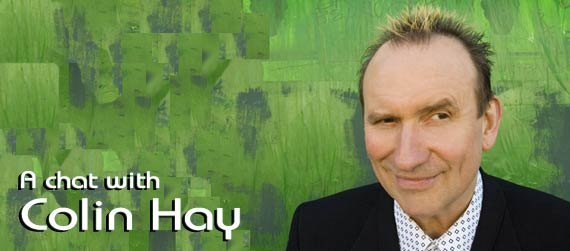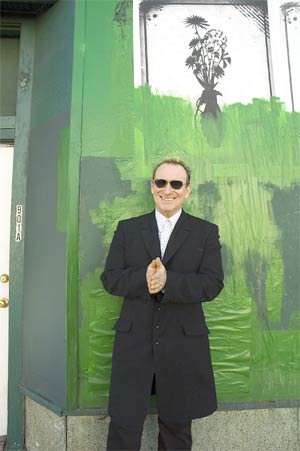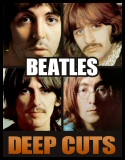
05/30/2007
Music Home / Entertainment Channel / Bullz-Eye Home
You couldn't have gotten out of the 1980s alive without hearing Men at Work's "Down Under" and "Who Can It Be Now?" at least 1,0000 times, and the group's songs remain ubiquitous on the radio even now. So why is it, then, that after nine solo albums, the band's lead singer – Colin Hay – still says, "My solo career is basically only starting"? Bullz-Eye had a chance to chat with Hay about how things are going for him these days, focusing on his latest release (Are You Lookin' At Me?), the effect that "Scrubs" and "Garden State" have had on his popularity, and his feelings about VH-1's attempts to reunite his former band.
Bullz-Eye: Hey, Colin, this is Will Harris from Bullz-Eye.
Colin Hay: How're ye doin'?
BE: Pretty good. How are you?
CH: I'm all right.
BE: I'm glad to talk to you. My wife and I actually traveled up to New York to see your show at the Village Theater back in 2004.
CH: Oh, really?
BE: Yeah! We took the train up from Virginia and spent a few days in the city, and caught you while we were there.
CH: That was a lot of fun, that one.
BE: Absolutely. It was a great time. Now, you were touring behind Man At Work at the time. Well, I mean, the Village Theater was a residency, but that was your most recent album at the time.
CH: Yeah, that was the album that was out. (The Village Theater shows) were kind of an attempt to shift gears to something a little bit more…thespian.
BE: I remember the label had kind of pitched that album to you as a way of reintroducing you to the world, so to speak.
CH: Exactly.
BE: Do you feel like it succeeded on that level?
CH: I think so, on some level. I'm not sure to which level, but I think it's been reasonably successful in just making people aware of the fact that I'm still alive. Even though it was doing the older songs, some of them were done in a different way, so it was a wealth of interest to people to hear me playing some of those songs acoustically…well, more acoustically. And, yeah, it was kind of like a calling card, especially for things like radio stations, which are supposedly still part of the music industry; you have to try and court them, try to get songs on the radio. So it's a way of buttering them up, if you can, a little bit in order for them to perhaps take something new, which they're most of the time loath to do. Well, from someone like myself, anyway. Usually, people at radio like you to stay in your little box, where you belong.
BE: Yes, we live in a wonderful culture of imposed niches.
CH: Yeah.
BE: It's been about three years since Man at Work and your new album, Are You Lookin' At Me? Did you just not have time to write because you were touring, or did you have the material ready to do and not have time to record it?
CH: Well, Compass also re-released an acoustic album that I'd originally released myself in 2000, called Going Somewhere; they re-released that in 2005 as an interim album. I was working on a new record, and I thought that I'd have that ready by about that time, but I didn't have it quite ready, so they said, "Well, let's release Going Somewhere," and that seemed to spark people's interest as well. I had the new record done pretty much toward the end of last year, but it seemed more appropriate to leave it until the start of this year to release it. But, yeah, I've been touring and writing songs, and…time flies by, y'know?
BE: The new album feels more stylistically diverse than your previous records. Was that intentional or coincidental?
CH: Probably coincidental. I vary rarely do anything intentionally. But I suppose (hesitates) When I listen to it myself – and I've only had the benefit of being able to do that in the last few weeks since it's been done – but I've been living in Los Angeles for a long time, and it feels to me that, even though I've been living here for about 17 years, it feels to me like the…dare I say it?...the first kind of American record that I've made. Stylistically, anyway, there seems to be some things that have crept in there, like the horns, and…I don't really know the words to describe them, but some of my heroes are people like Randy Newman and Joni Mitchell, and I've always loved the way Randy Newman's records sounded and the subjects that he chose to write about. So I always try to aspire to come close to things like that.
BE: The songs are certainly more fleshed out, as opposed to being strictly acoustic.
CH: Yeah, well, the acoustic thing is really just more necessity than anything. It wasn't so much that I wanted to make records acoustically or tour acoustically; a number of years ago, I couldn't really afford to take a band on the road, financially, and so you just go, "Well, you have to play acoustically." So that's what you start doing. And people started to enjoy that, so I've just kept doing that for the last decade or so…or more, even. And then people emailed me and said that they wanted an acoustic album, and so I did that. But, no, I love working with different musicians, and this album has given me a chance to do that.
BE: I see that Chad Fischer (of the band Lazlo Bane) still managed to sneak on for a few songs.
CH: Yeah, he's really, really talented, and he's my great friend, but he's been very busy. I was touring with another drummer, Charlie Paxson (http://www.charliepaxson.com), who's fantastic. Chad's great, too, though. He mixed the album for the most part. He's a talented boy.
BE: So with your exposure on "Scrubs" and in "Garden State," is Zach Braff officially your new best friend now?
CH: No, no, not at all. But he's been very, very helpful for me, y'know? Actually, I met him through Chad, coincidentally, and all that stuff happened quite organically. He came to see a show in Hollywood before he had the gig in that television show, "Scrubs." And once he did, he said, "Oh, I'm gonna take your albums and get them on the show," which he did, which was huge exposure for me, and really, really helpful. And then the "Garden State" thing, which was pretty huge. So, yeah, he's been a great help to my career, Zach. (chuckles)
BE: What did you think about all of the accolades for "I Just Don't Think I'll Ever Get Over You" that suddenly started rolling in after the soundtrack took off?
 CH: Well, it's great affirmation, because you write
a song like that, and you say, "Well, that's not a bad song." It was
on an album called Transcendental Highway in 1997, which never
really saw the light of the day, and you write these songs and you
record them, and you think, "Well, maybe at some point, someone will
pick up on these songs." And that one got picked up on. And when it
did actually gain the exposure, people responded really positively
to it, so you kind of think, "Well, I was right all along! I had a
sneaking suspicion that that was a good song!"
CH: Well, it's great affirmation, because you write
a song like that, and you say, "Well, that's not a bad song." It was
on an album called Transcendental Highway in 1997, which never
really saw the light of the day, and you write these songs and you
record them, and you think, "Well, maybe at some point, someone will
pick up on these songs." And that one got picked up on. And when it
did actually gain the exposure, people responded really positively
to it, so you kind of think, "Well, I was right all along! I had a
sneaking suspicion that that was a good song!"
BE: (laughs) I suppose the same could be said for "Waiting For My Real Life To Begin" (originally released on 1994's Topanga). That almost has a cult life of its own, thanks to "Scrubs."
CH: Absolutely, yeah. That's a song that just kind of…it's one of those ones that I love because, as you say, it has a life of its own. It just kicks along, y'know, and at some point, it might be used in a movie or it might do this or it might do that, but it's got a real life, that song. It has a real life force of its own.
BE: My wife has said that it's a song that she didn't realize was her theme song until it wasn't anymore.
CH: (laughs) That's funny.
BE: I just read recently that you're the uncle of Sia Furler, of the group Zero 7.
CH: Oh, yeah, yeah. Well, not blood uncle. But I've known her since I was born, and I was a friend of her father's and her mother's, so I've seen her grow up ever since she was a little girl. She's a mighty talent.
BE: When I talked to you a couple of years ago about the possibility of seeing reissues of (Men at Work's) Two Hearts and (Hay's debut solo album) Looking For Jack, I could tell that their non-availability really made you unhappy. Has there been any progress on that front?
CH: Oh, no, no. None at all. I can't remember specifically that conversation, but it doesn't make me unhappy at all. To be honest, I never think about it, and I don't make any moves to try and change that at all. It's not something that I really ever think about, to be honest with you.
BE: Well, maybe I overestimated your unhappiness. I just know that when I commented on how it seemed like it would only make sense to reissue the third Men at Work album since they'd already reissued the other two, you were, like, "Yeah, well, it didn't make them any money then, so why would they put it back out again now?"
CH: Yeah, well, that's right. That's what it is. It's not something…it's just a purely financial decision, I would think. Y'know, I like the Two Hearts album, but I've forgotten about it, to be frank. Y'know what I mean? It's just one of those things. It's really not that important. Well, it's not that it's not important; you just haven't got time. You haven't got time to worry about stuff that's in the past; it's really a pointless exercise. (Writer's note: Hay is clearly in a much more philosophical place in his life these days than he was in 2004, when his official stance on Columbia reissuing the out-of-print material was, "They haven't done anything about it, 'cos it's fucking hopeless," and that it was "frustrating, because it's dead product.")
BE: I guess that, with both those albums, any of the songs that you really loved, you've since re-recorded acoustically for one record or another, anyway.
CH: Well, I did "Looking For Jack," but not acoustically. I recorded it pretty close to the original; it was done in London, and it came out really well. I think it was on the Man at Work album. That's the benefit. If you feel like it, you can re-record whatever you like. And I'll probably continue to do that, if I decide, "Oh, I want to record that song again." But I always loved that song in particular on that album.
BE: And I know you also re-recorded "Children on Parade" (from Two Hearts) as well.
CH: Yeah, well, that was more of a spontaneous choice while I was in the studio, when I just started playing it. I've always quite liked that song, for some reason. I don't quite know why, but it just sort of popped up again.
BE: Does the diehard following that your solo career has inspired…cult, sure, but definitely diehard…does knowing that those fans are out there help you when you're playing a show and you hear the loudmouths who just want to yell for "Who Can It Be Now?" and "Down Under"?
CH: (dismissively) I don't care if people yell out "Down Under." I love "Down Under." It's been a very, very good song for me, so I'll never mind playing "Down Under" 'til they put me down under.
BE: (laughs) As far as your solo work, do you have a specific favorite album that you feel like didn't get its just due commercially? I mean, I know some of them barely even got released in the States at all.
"I don't care if people
yell out "Down Under." I love "Down Under." It's been a very, very
good song for me, so I'll never mind playing "Down Under" 'til they put me
down under." CH: Well, none of them have really done anything,
y'know? My solo career is basically only starting in the scheme of
things, as far as the mainstream is concerned. I mean, look: my band
came out, we sold over 10 million albums or whatever it was of the
first two albums, and we were a big band on a big label. You can't
even really try to compete with that, because it's just a phenomenal
experience. And then the solo albums since then, none of them have
really done anything to speak of. So what do you do? You just keep
going. Look, I have no complaints about anything, really, because I
have a great life. So I'm never one to go, "Oh, that didn't sell, and
that didn't sell." It's…what's the word? (pauses) I'm not
quite sure what the word is, but I've just kind of been doing the best
that I can for the last 15 years, and doing what I thought was the
best thing to do. I have a stumbling process. It's not really that
I think that much out; I just record the songs, put them on CDs, and
bring them into existence. You can say that maybe I had a run of bad
luck, because I was involved with a couple of labels that went out
of business, but they were nice people and they heavily believed in
the albums; they just ran out of money. But I am really happy working
with the label that I'm with right now, because they're great people,
and we have some energy behind it, so that's a really great thing.
I feel like I've got some nice partners to work with, which makes a
big difference when you're trying to market a record. There's a lot
of balls you have to keep in the air, and I'm not very good at doing
everything myself. I try, but I'm not very successful at it.
BE: And I've just got one more question, because I know you're trying to keep on schedule. What do you hear about this new MySpace page that's been established for a Men At Work reunion? It says that Greg Ham, Jerry Speiser and John Rees are in.
CH: (uncertainly) Oh, yeah. Well, I don't know about that. I have no idea. Would that be James Ennis that's doing that?
BE: You know, I'm not even sure. The person who sent me the link to add them as my friend wasn't someone whose name I recognized. But I get the impression from reading the site that it's something to do with VH-1's "Bands Reunited" trying to get the group back together in its entirety. (Writer's note: Hay and Ham have done several tours together under the Men At Work name, but the full line-up hasn't played together since their heyday.)
CH: Yeah, I wouldn't see the point in that myself. What would you think the point would be in that?
BE: Well, I don't guess there'd be a lasting one. But, then, I've got all of your solo albums, so I might be the last person to ask. But I'd still love to see it, of course.
CH: I mean, I think it's always good for VH-1, but I don't think it's ever really particularly good for the bands.
BE: Very rarely. I mean, unless the members had a really poor relationship and the show miraculously heals the rift and brings them all back together again.
CH: Yeah, and then you think, "Well, why would you want to do it like that?" I mean, if you're gonna be friends with someone, surely you can work that out amongst yourselves. You don't need a corporate video channel to help you do that, surely. (laughs)
BE: I get the impression that there's not much chance of Ron (Strykert) getting back involved, anyway.
CH: Well, have you ever spoken to Ron?
BE: Um, well, I've read the comments on his MySpace page, but I've never actually spoken to him.
CH: (chuckles)Yeah, well… (drifts into silence)
BE: (laughs) I get the impression that that says it all. (Writer's note: go to the page and read Ron's comments about Colin, and you'll see what's so funny about the suggestion that these two might be in the same room at any time in the near future.)
CH: All right.
BE: Well, hopefully, you'll get down to this vicinity sometime soon. I'm in Hampton Roads, Virginia.
CH: Yeah, hopefully. I sometimes do. I've played there before, but I don't know if I'm getting down there this time or not.
BE: If not, I hope to see you live soon.
CH: All right, man. Thanks a lot!








